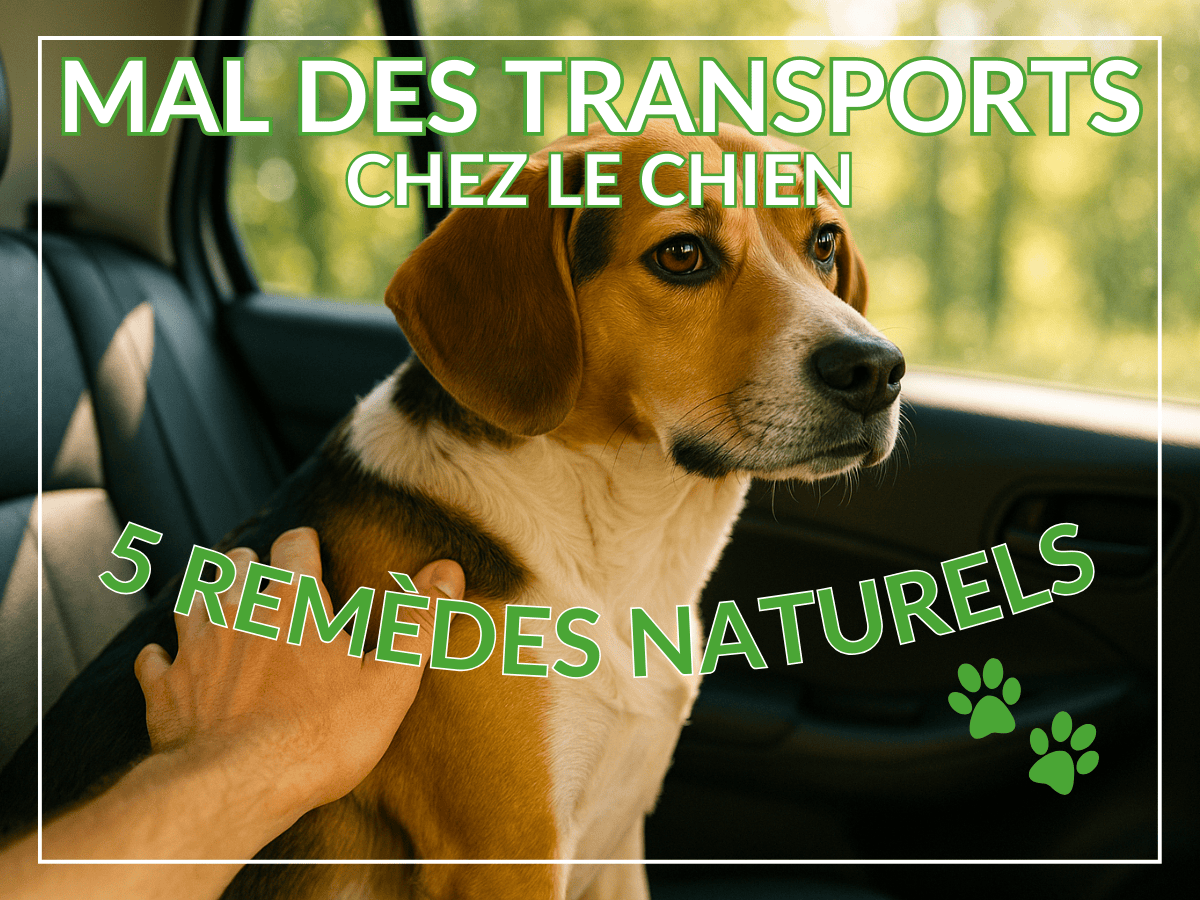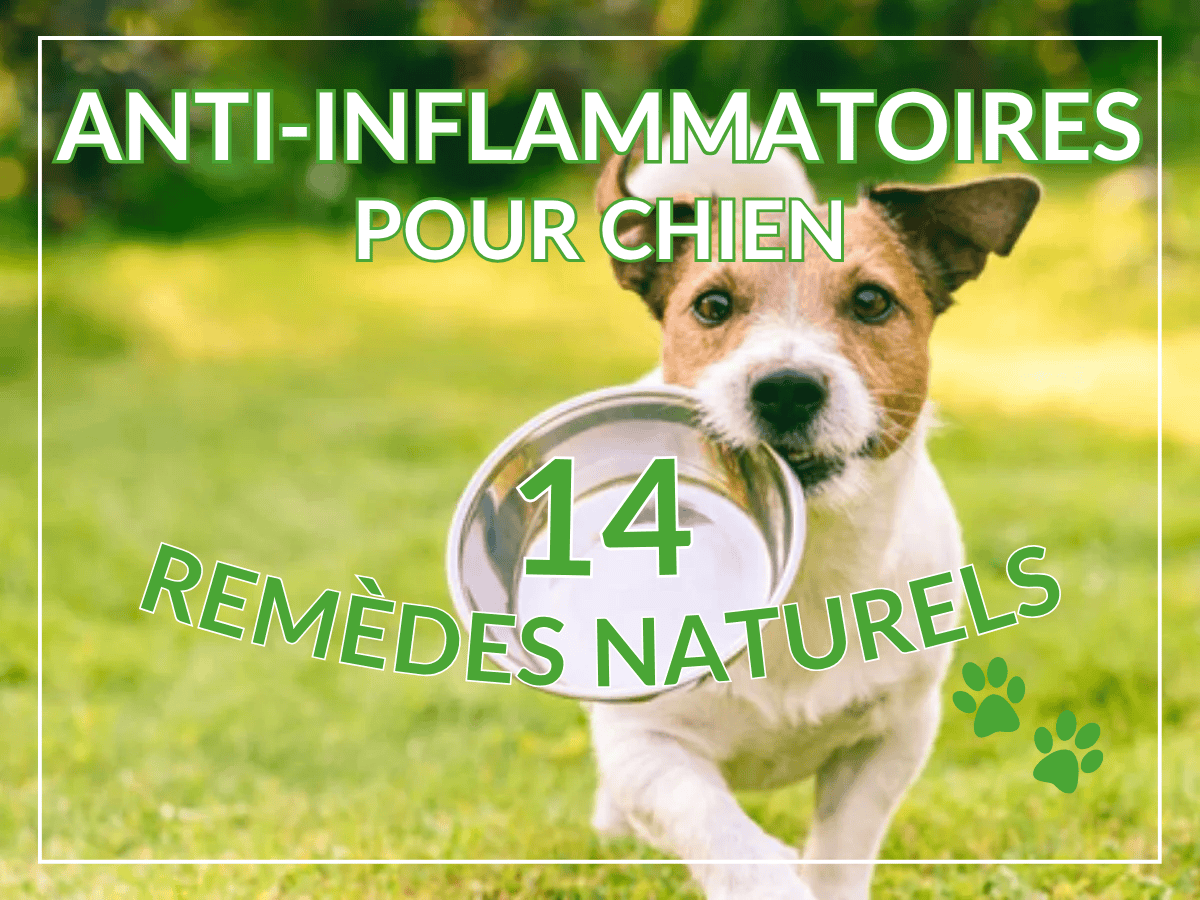
Car Sickness in Dogs: A Complete Guide to Natural Relief
Traveling with your dog can be a wonderful adventure… unless the journey becomes a real ordeal for both of you.
Motion sickness is a common problem for many dogs, causing stress, discomfort, and sometimes even panic. Fortunately, there are solutions to help them better cope with travel, including natural remedies and gentle treatments that respect their well-being.
- Click to learn more: 👉 NATURAL Support for your dog suffering from MOTION SICKNESS. 🐶
In this article, discover everything you need to know about motion sickness in dogs, as well as the best options to relieve it naturally.
What is motion sickness in dogs?

Motion sickness, also known as kinetosis, is a disorder that occurs when the brain receives contradictory signals about body movement. The inner ear perceives movement, but the eyes see a fixed environment (for example, the inside of the car). In humans, this causes the same sensation as seasickness. In dogs, this discrepancy between perceptions often leads to marked discomfort.
Kinetosis is particularly common in:
- Puppies and young dogs (their inner ear is not yet fully developed)
- Anxious or sensitive dogs
- Animals that have already had a negative experience in a car
Most often, car sickness is not dangerous in itself, but it can cause significant stress and deter the dog from traveling in the future.
What causes motion sickness?

Motion sickness in dogs can be linked to several factors, sometimes combined:
- Immaturity of the vestibular apparatus
The inner ear, which helps with balance, is still developing in puppies. This is why many young dogs become nauseous during car rides. Most grow out of it and stabilize, but not always. - Stress and anxiety
The dog may associate the car with an unpleasant experience (vet visit, noise, feeling of loss of control). The anticipation of a trip can then be enough to trigger kinetosis. - Sudden movements and vibrations
Sharp turns, accelerations, and frequent stops increase the feeling of disorientation. - Genetics and individual sensitivity
Some breeds or individuals are more prone to anxiety and thus motion sickness. - Duration and travel conditions
A long journey without breaks increases the risk of discomfort.
What are the symptoms of motion sickness in dogs?

Signs vary depending on the dog's intensity and sensitivity. Here are the most frequent symptoms:
- Excessive drooling: ropes of saliva may appear at the corner of the mouth.
- Repeated yawning: a sign of stress.
- Significant panting even if the temperature is normal.
- Lethargy: your dog appears exhausted and refuses to move.
- Restlessness, whining, whimpering: it tries to escape.
- Trembling: a sign of deep anxiety.
- Nausea: some dogs swallow their saliva more often.
- Vomiting: one of the most characteristic symptoms.
- Diarrhea or involuntary urination in very stressed dogs.
It's important not to minimize these signs, as discomfort can increase over time and reinforce aversion to the car.
What conventional treatments exist?

If motion sickness is severe, the veterinarian may recommend:
- Anti-emetic medications
The most common is maropitant, which works by blocking the vomiting center. This treatment is effective against nausea but does not always reduce anxiety. - Mild anxiolytics
They help relax the dog but require a prescription and can cause drowsiness. - Calming pheromones
Diffused in the car (spray or collar), they mimic reassuring maternal pheromones.
These approaches can be effective, but many owners hesitate to resort to chemical medications as a first choice. That's why they turn to a gentler natural remedy with no side effects.
Are there effective natural remedies for motion sickness in dogs?

More and more owners are choosing natural treatment to help their dog cope with car rides without side effects or excessive sedation. These approaches help reduce discomfort, anxiety, and nausea while respecting the animal's emotional sensitivity.
Here are the most recognized natural options and how to use them practically:
1. Ginger
Ginger is an ancestral natural remedy, renowned for its anti-nausea and digestive properties. It acts by regulating stomach contractions and reducing the sensation of dizziness. Many owners use it to soothe digestive disorders related to travel stress.
How to administer it?
- You can give a small piece of fresh grated ginger mixed with a little food 30 minutes before departure.
- There are also capsules or natural ginger-based treats specifically dosed for animals.
Be careful to respect the dose recommended by your veterinarian or the product manufacturer, as an excess can cause an irritating effect.
Ginger is particularly appreciated because it acts quickly and without causing drowsiness.
2. Bach Flowers
Bach flowers are floral extracts used to soothe intense emotions and stress. They are ideal for dogs who associate the car with an unpleasant memory.
How to administer them?
- A few drops can be placed directly in the mouth, on the gums, or on a treat.
- You can also dilute them in a little water to give just before the trip.
Start administration a few days before departure for optimal effect.
Specific "travel" blends are formulated to bring serenity and confidence.
3. Homeopathy
Homeopathy is a natural remedy particularly appreciated for its gentleness and tolerance. Several homeopathic strains are recommended for motion sickness:
- Cocculus indicus: against nausea and dizziness.
- Tabacum: if the dog becomes pale and hypersensitive to odors.
- Nux vomica: useful in cases of vomiting associated with anxiety.
How to administer it?
- In the form of granules to dissolve in the mouth or in a little water.
- Some homeopathic products are available in an easy-to-use oral spray.
For optimal effect, give the first dose the day before departure, then one dose on the morning of the trip and possibly a dose during the trip if necessary.
Homeopathy acts gently, without addiction and without side effects.
4. Relaxing plants
Certain plants have calming properties and can help relax the dog before and during travel:
- Chamomile: soothes mild anxiety and supports digestion.
- Passionflower: known for its gentle sedative effect.
- Valerian: used to calm nervousness.
How to administer them?
- In the form of tablets, capsules, or liquid drops.
- It is best to start 2 to 3 days before the trip to promote a gradual effect.
Always respect the recommended doses and check that the product is designed specifically for animals.
These plants are often combined in natural food supplements.
5. Progressive habituation
Desensitization is one of the most effective long-term natural methods, even if it requires patience. It consists of gradually and positively familiarizing the dog with the car.
How to proceed?
- Have him get in the car with the engine off. Reward him with treats and petting.
- Accustom him to staying inside for a few minutes, without starting.
- Start the engine, but without driving. Continue to reward him.
- Move to very short trips (a few minutes).
- Gradually increase the duration and distance.
These sessions should remain short and positive, without ever forcing the dog.
Progressive habituation can be combined with a natural remedy to reinforce the feeling of security and limit physical reactions.
Practical advice
You can combine several natural approaches (for example, a homeopathic spray and a little ginger) if your veterinarian confirms their compatibility.
A homeopathic remedy for your dog
At HomeoAnimo, we have developed a unique natural remedy: VoyagAnimo (Motion Sickness). Specially designed to support the nervous and gastrointestinal systems during stressful situations such as travel, vet visits, etc. It also effectively relieves motion sickness.
Our homeopathic formula combines recognized strains to soothe stress and reduce nausea. It is suitable for dogs, cats, horses, and pets.
- Easy to administer: a simple spray in the mouth or in water.
- No side effects: no drowsiness, no dependence.
- Gentle formula: suitable for all ages.
Suzanne's Testimony
"Made a world of difference!
My cat used to hate traveling. She'd have panic attacks, even on short distances. With this remedy, my cat was so calm and didn't even meow during our long trip. It's incredible! It only took one spray the day before we left and one spray on the morning of the trip, and that was it. Thank you, HomeoAnimo!!!"
Watch our video
Practical tips for serene travel with your dog

In addition to natural treatment and homeopathic remedies, a few simple actions can truly make a difference in reducing your companion's stress and preventing motion sickness. Here are the most useful recommendations:
- Do not feed right before departure
Avoid giving a hearty meal 3 to 4 hours before the trip. Traveling on a full stomach increases the risk of nausea.
However, you can leave fresh water available until departure. - Opt for a calm environment
Speak softly to them and avoid shouting or sudden movements. If possible, leave the radio on with soothing background noise or use a special "calm animal" playlist.
Some relaxing music is designed to calm dogs. - Properly secure your dog
Place your dog in a well-ventilated travel crate or with a suitable safety harness. Feeling contained and protected can reduce stress and limit sudden movements when turning. - Ventilate the vehicle
An overly hot and poorly ventilated cabin accentuates nausea.
Be sure to maintain a comfortable temperature and a slight airflow, without directing the flow directly at your dog. - Take regular breaks
Stop every 1 to 1.5 hours to allow your dog to walk, drink, and relax. These breaks are essential, especially on long journeys. - Associate the car with positive experiences
Before a long trip, don't hesitate to offer car rides to pleasant places (walks, parks) so that your dog doesn't associate the car only with stressful moments like vet visits. - Use a natural remedy
Natural approaches (homeopathy, ginger, Bach flowers, relaxing plants) help reduce stress and digestive problems without side effects.
Do not hesitate to administer the chosen natural treatment the day before and on the morning of departure, according to the manufacturer's recommendations. - Stay zen
Our companions are true emotional sponges. If you are relaxed and positive, your dog will feel it and will feel more confident.
By following these tips and choosing a suitable natural remedy, you can transform journeys into much more serene and pleasant moments, for both you and your dog.
FAQ – Motion sickness in dogs
How long does it take for my dog to get used to car rides?
Every dog is different. With patience and a well-chosen natural remedy, some dogs improve in a few weeks.
Can I combine a veterinary treatment and a natural remedy?
In many cases, yes. Ask your veterinarian for advice.
Are puppies more sensitive?
Yes, their inner ear is still developing, which explains their greater vulnerability.
Conclusion
Motion sickness is not inevitable. Thanks to a better understanding and adapted solutions, you can transform the experience of traveling with your dog. If you are looking for a natural and gentle treatment, homeopathy and natural remedies are a safe and effective alternative that respects your companion's emotional and physical well-being.
If you are concerned that your pet is afflicted by a health problem, our Free Animal Health Recommendation can help. In addition to getting advice and recommendations from our Natural Health Advisors, they will also guide you through the products and treatment options best suited to your pet's health needs.

























Leave a comment
This site is protected by hCaptcha and the hCaptcha Privacy Policy and Terms of Service apply.